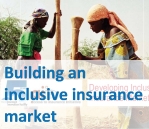Leveraging technology-enabled banking agent distribution networks -- FINO Fintech Foundation
About the Project
Organizational Overview
FINO (Financial Inclusion Network & Operations Pvt. Ltd) provides a complete electronic banking technology payment platform for low-income customers combined with an extensive services delivery channel. Founded with the primary objective of building technologies to enable financial institutions to serve the underserved and unbanked market, FINO develops financial services delivery systems to enable financial institutions to lower transactions costs, increase their outreach and bring more transparency to their business. FINO Fintech Foundation is the business correspondent arm of FINO. It acts as an intermediary in providing financial and banking serviceswith the objective of ensuring greater financial inclusion and increasing the outreach of the banking sector. In five years, with over 38 million customers and 20,000 transaction points in 386 districts across 26 states, FINO is the market leader in delivering products and services to serve low-income customers and enable doorstep banking.
Project Description
Beneficiaries
The target market comprises of No Frills Savings Account (NFSA) holders who have recently been introduced to financial services. They are largely agricultural cultivators, labourers or small landholders with income in the range of INR 5,000 to 9,000 (USD 100 to 180) per household per month. The income is seasonal in nature and influenced by weather factors such as drought, floods and rainfall, and crop failures due to pests. Apart from agriculture, other occupations held are fishing, farming, cottage industry, pottery, carpentry and small businesses.
Education and use of formal financial services is low in this market segment.
Learning Agenda
The following are the questions that the project seeks to address:
- What process changes need to occur to sell insurance through the business correspondent channel?
- Are business correspondents acceptable by low-income customers as insurance agents?
- Is it financially sustainable for business correspondents to cross-sell microinsurance to NFSA customers?
- How do insurer’s costs per customer compare between business correspondents as distributors vs. direct sales agents?
- How effective is mobile phone technology in providing training to a remote and "non-insurance" sales force?
- What role can technology play in the sales and fulfilment of telemedicine services?
- How acceptable are hospital cash and telemedicine services amongst low-income households (related to willingness to pay for a health consultation)?
- Does telemedicine improve take up and renewals, and help in reducing costs of a health insurance programme?










